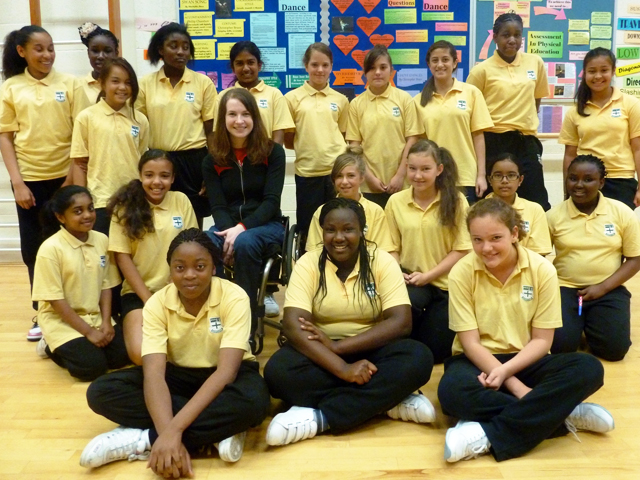
Canadian Paralympian, Ilana Duff, who competed in the 2008 Summer Paralympics in Beijing, met with students from St Angela’s Ursuline School in East London’s Forest Gate during the Paralympic Games. Duff mainly competed in category T53 sprint events and won a Paralympic bronze medal in the women’s 100 metres T53 event. She was in London to support her husband, fellow Canadian Alexandre Dupont, also a wheelchair sprinter, who competed in the men’s 400 and 800 metres as well as the 5000 metres T54 event.
Building on the mottos of the Olympic and Paralympic Games respectively, Duff set out to “inspire a generation” and to witness to “spirit in motion”. She spoke to teenage students of how she had been thrown from a horse as a teenager resulting in her spinal cord becoming twisted back on itself which left her paralysed from the waist down.
Aside from a passion for horses she had had no interest in sport until encouraged on several occasions by a local coach in Saskatoon to try out a racing wheelchair.
“Once I tasted of how fast I could go,” said Duff, “I wanted more and before I knew it was training three times a week. This increased to six times a week as I began to engage competitively.” She soon found that “provincial events led to national events until,” she said, “I found myself performing for my nation on the international stage, and the biggest one of all, the Paralympic Games.”
Shortly after winning her bronze medal, her coach, himself a multiple Paralympic medallist from five Games, approached her and, with a tear in his eye, shared that her medal meant more to him than any medal he had brought home. “These were the most important words I ever heard from him” she related. “It was wonderful to go home and to share this whole experience with my family and friends.”
Duff went on to speak about how her attitude to sports has now changed dramatically. “I didn’t realise how good I would feel being involved in sport.” she exclaimed. “If I could get to training and finish the training session I would be on top of the world no matter how I felt before I went. Physical activity makes you feel good. It brings your body to a healthy place and your mind to a healthy place too. I am a strong advocate for anyone who thinks they shouldn’t be involved in sport to get involved.”
Speaking of her disability she voiced how it was “very difficult to cope with at first. I had to just embrace the wheelchair and get on with my life. I still have bad days and often used to ask myself why I ended up in a wheelchair. The thing I miss the most, although such a small thing, is being able to wiggle my toes.”
Seeing the goodness of life became important to her. “I have to keep reminding myself that I have been given an amazing opportunity and I wouldn’t trade anything to walk again. This is my life. This is who I am. It’s made me who I am today. I embrace every day as it comes to me.”
Although Duff had stopped racing a few years ago, she revealed that “the Games here in London have prompted me to take up racing again. My husband watched me compete in China; I watched him here in Britain. Hopefully we will both get the chance to compete in Brazil in 2016.”
As her time with the students drew to a close, Duff held the gaze of those present and declared: “If I could give you one piece of advice it would be to find one thing that you absolutely love doing. You don’t have to be great at it or even good at it. But if you love it then you know you can give it everything you’ve got and be pleased with your own performance.”
After taking questions and posing for photographs, Duff then autographed over 100 student planners.